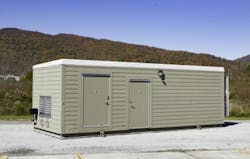Rittal Corporation recently teamed up with Edge Mission Critical Systems (Edge MCS) to support Edge’s Binary Bunker brand modular data center systems that are designed to support edge network applications. Binary Bunkers contain Rittal enclosure, racking and cooling products.
When announcing the deal, Rittal said, “As the Internet of Things expands, massive amounts of data and content require faster processing and better security. Products like the Binary Bunker become more appealing than large capital expenditures on conventional data center platforms. For savvy companies, edge computing allows them to get closer to the data, improving speed, performance, productivity and security at a fraction of the cost of a conventional data center.”
The prefabricated modular data centers employ lightweight concrete for strength, long life, and environmental stability, Rittal continued. The Binary Bunkers are triple-seal protected—bullet-, vandal-, and fire-resistant. “Edge’s network deployments go beyond traditional enterprise level modular data center deployments,” Rittal added. “They serve areas that need high-security requirements such as government, military and utility operations.”
Robert Peck, vice president of Edge MCS, commented, “Edge MCS doesn’t want to have to explain to our customers who our suppliers are, how long they have been in business and why we chose them. We want our supplier choice, like Rittal, to be self-evident, favorably known and provide comfort that the brand and supplier are here for the long haul.”
Edge MCS flagship products are 10-rack and 20-rack standard modular data center solutions that deliver 15kw per rack, Rittal additionally noted. “The Binary Bunker is scalable, to provide a single unit or several to form a modular data center campus. Maintaining the correct ambient and enclosure temperature is vital for the clients of Edge MCS. For racking and climate control in all these sensitive applications, they turned to Rittal.”
Rittal’s LCP in-row chillers are used in Binary Bunker data centers. The company’s climate-control systems provide resiliency and redundancy protection, Rittal added. Specifically, the company said, “Resiliency is documented by Rittal, providing the data to support their mean time over failure for the row chillers and various components.” Furthermore, the company said, its closed-loop and in-row cooling systems use chilled water or direct-expansion enclosures, and water-distribution enclosures. “This allows Edge MCS to provide precise thermal management options in the extreme conditions of their installations, from the South Pole to the Arabian desert,” Rittal proclaimed, adding that its “superior hot and cold aisle containment solutions and energy-efficient in-row cooling systems are designed with our intelligent cabinet platform to provide state-of-the-art solutions to maximize client’s cooling infrastructure and lower power usage efficiency [PUE].”
The multiple fans and thermal controls of in-row chillers were paid with an outside consider unit for redundancy, thereby creating a dual-redundant solution. “By incorporating wall-mount Blue e+ HVAC systems, a third layer of redundancy is available if needed,” Rittal said.
TS 8 enclosures are seismic-rated to Zone 3 or 4 with additional earthquake accessories. Paired with the Edge MCS modular data center units, which are rated for Zone 4, Edge can meet the incoming level of seismic requirements with their secure floor and top bracing plan, Rittal explained. Data remains secure in the most earthquake-prone locations worldwide, the company added. “Rittal enclosures and Edge MCS have teamed up on installations around the globe,” the company concluded. “The worldwide approval and certificate of Rittal components allow them to serve their clients in any climate, anywhere.”
